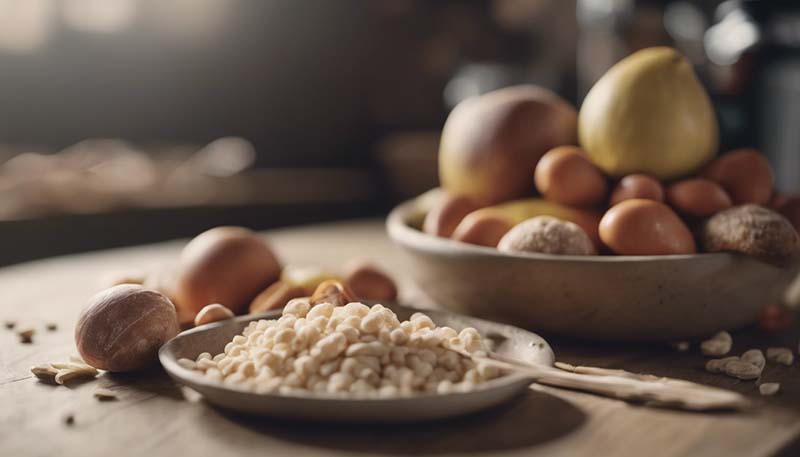Nutritional Strategies for Athletes with Celiac Disease
2024-06-12
Nutritional Strategies for Athletes with Celiac Disease
Celiac disease is an autoimmune disorder that affects approximately 1 in 100 people worldwide and can significantly impact an athlete's ability to perform at their best. It is caused by an adverse reaction to gluten, a protein found in wheat, barley, and rye. For athletes with celiac disease, maintaining a balanced and gluten-free diet is crucial to support their training and recovery. This article will discuss the nutritional strategies that can help athletes with celiac disease optimize their performance and overall health.
Understanding Celiac Disease
Celiac disease is a genetic condition that triggers an immune response when gluten is ingested. This response damages the lining of the small intestine, impairing nutrient absorption. Symptoms can vary from person to person but may include gastrointestinal issues, fatigue, bloating, and anemia. Early diagnosis and adherence to a strict gluten-free diet are essential for managing the condition and preventing long-term complications.
Importance of a Balanced Diet
A well-rounded diet is vital for athletes, especially those with celiac disease. It should include a variety of nutrient-dense foods to provide the necessary energy, macronutrients, and micronutrients for optimal performance and recovery. Some key components to consider include:
Advertisement
- Protein: Essential for muscle repair and growth, protein should be a primary focus in an athlete's diet. Good sources include lean meats, fish, eggs, dairy, legumes, and gluten-free grains like quinoa and buckwheat.
- Complex Carbohydrates: These provide a steady source of energy for workouts and training. Opt for gluten-free options like rice, corn, and potatoes.
- Healthy Fats: Necessary for hormone production and joint health, healthy fats can be found in avocados, nuts, seeds, and olive oil.
- Fruits and Vegetables: Rich in vitamins, minerals, and antioxidants, these should make up a significant portion of an athlete's diet.
- Hydration: Staying properly hydrated is crucial for performance and overall health. Water is the best choice, but electrolyte-containing drinks can be beneficial during intense workouts or in hot conditions.
Navigating a Gluten-Free Diet
Adhering to a gluten-free diet can be challenging, especially when trying to meet the increased nutritional demands of an athlete. Here are some strategies to ensure a balanced and gluten-free diet:
- Educate Yourself: Learn about which foods contain gluten and which are naturally gluten-free. This knowledge will help you make informed choices and avoid potential cross-contamination.
- Read Labels: Always read food labels to check for hidden sources of gluten. Some common sources include soy sauce, salad dressings, and certain vitamins and supplements.
- Plan Meals: Meal planning can help ensure you're getting a balanced diet and prevent last-minute decisions that may not be gluten-free.
- Seek Professional Advice: A registered dietitian or nutritionist with experience in celiac disease can provide personalized guidance and help you navigate the gluten-free diet.
- Supplement Wisely: Some athletes with celiac disease may be at risk for nutrient deficiencies due to the limited diet. Consult with a healthcare professional about the need for supplements, such as iron, calcium, and vitamin D.
Performance-Enhancing Foods
In addition to a balanced diet, certain foods can provide performance-enhancing benefits for athletes with celiac disease:
- Gluten-Free Oats: Controversial in the celiac community, some studies suggest that a select few strains of oats may be safe for those with celiac disease. Always consult with a healthcare professional before incorporating oats into your diet.
- Probiotics: These can help support gut health, which is essential for nutrient absorption and overall well-being.
- Anti-Inflammatory Foods: Foods like fatty fish, berries, and leafy greens can help reduce inflammation and support recovery.
- Gluten-Free Grains: Options like quinoa, buckwheat, and rice can provide energy and essential nutrients without the risk of gluten exposure.
Challenges and Solutions
Athletes with celiac disease may face unique challenges when it comes to nutrition. Here are some common issues and potential solutions:
- Traveling: Eating gluten-free while traveling can be difficult. Research local restaurants and grocery stores that offer gluten-free options, and pack safe snacks for旅途中 (on the go).
- Social Situations: Dining out or attending social events can be tricky. Communicate your dietary needs to hosts and be prepared with alternatives if necessary.
- Energy Levels: A gluten-free diet can sometimes lead to lower energy levels due to nutrient deficiencies. Ensure you're consuming a balanced diet and consider supplements if recommended by a healthcare professional.
- Weight Management: Some gluten-free products are high in calories and sugar. Be mindful of portion sizes and choose nutrient-dense options to maintain a healthy weight.
Conclusion
Athletes with celiac disease can still achieve peak performance by following a well-planned, gluten-free diet. Education, meal planning, and professional guidance are key to ensuring adequate nutrition and preventing nutrient deficiencies. By focusing on a balanced diet, incorporating performance-enhancing foods, and addressing common challenges, athletes with celiac disease can thrive in their sport and maintain optimal health.

Comments